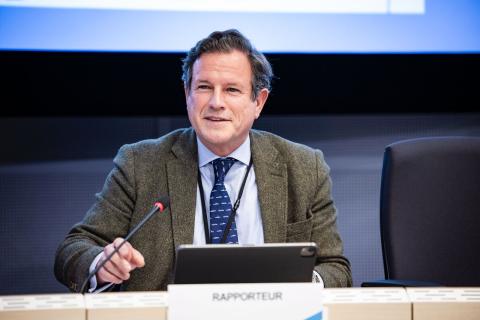European Economic
and Social Committee
Can the European Oceans Pact deliver a sustainable blue economy?
The European Economic and Social Committee (EESC) has welcomed the European Oceans Pact, urging the European Commission to ensure it goes beyond a mere statement of intent and becomes a comprehensive framework for action. In its exploratory opinion, adopted during the March plenary, the EESC stresses that for the pact to be effective, it must align with existing EU policies such as the blue economy strategy, the Green Deal, and the Sustainable Development Goals (SDGs). Most importantly, it should strike a balance between economic prosperity, environmental regeneration, and social equity.
As part of shaping the future of the pact, the EU Commission launched a public consultation, which has been open until February 17th. This offered an opportunity for stakeholders and citizens alike to contribute their views on this ambitious initiative. In addition, the EU Commission also requested an exploratory opinion to the EESC and CoR to gather the input of organised civil society and local authorities.
The ocean is at a crossroads. Climate change, pollution, overfishing, and industrial expansion threaten marine ecosystems, while coastal communities face economic and environmental uncertainty. In response, the European Commission is advancing the pact, which aims to strengthen governance, promote a sustainable blue economy, and drive scientific innovation.
Javier Garat Pérez, rapporteur of the opinion, emphasized the importance of a holistic approach, stating: "Coastal communities in the EU are facing a number of interrelated economic, social, and environmental challenges. To face these challenges, we need to promote a sustainable and competitive blue economy, including fisheries and aquaculture, maintain a healthy, resilient, and productive ocean, and work on a comprehensive agenda for marine knowledge, research, innovation, and investment."
The first step is improving maritime governance. Current policies remain fragmented, with overlapping regulations and institutions. The EESC calls for better coordination between EU agencies, including Frontex, the European Maritime Safety Agency (EMSA), and the European Fisheries Control Agency (EFCA), to optimize data collection and improve policy effectiveness. It also recommends setting up working groups dedicated to ocean matters across all EU institutions, ensuring maritime concerns remain a central priority.
Europe’s blue economy, which includes fisheries, aquaculture, shipping, and emerging offshore industries, has vast potential but needs reform. The EESC proposes creating an industrial alliance for blue economy value chains, bringing together businesses, researchers, policymakers, and investors to drive innovation. The pact should also support sustainable shipbuilding, digitalization, and resilient supply chains, ensuring the sector remains competitive while reducing its environmental footprint.
Maritime spatial planning must also evolve. Offshore energy expansion, for instance, must coexist with fishing and biodiversity protection. Therefore, positive coexistence and ecosystem-based approach should be promoted. A portion of offshore industry revenues should be reinvested in local communities, fostering a fairer distribution of economic benefits. Moreover, the EESC calls for an EU blue food action plan by 2026, ensuring that fisheries and aquaculture can thrive within ecological limits.
Science and technology will be critical to shaping a sustainable maritime future. The EESC urges the EU to boost funding for ocean research through initiatives like Horizon Europe and the European Maritime, Fisheries and Aquaculture Fund (EMFAF). A dedicated evaluation mechanism should also be established, ensuring that policies are backed by real-time scientific data and progress is monitored transparently.
The pact must also address social concerns. The maritime sector is facing a labor crisis, with workforce shortages and an aging demographic. The EESC advocates for a just transition, ensuring workers have access to training, reskilling, and secure employment as industries evolve. Young people must be encouraged to enter the sector, and support must be provided for those unable to transition to new roles.
Moreover, the pact should recognize the cultural heritage of coastal communities, preserving traditional fishing practices while integrating them into modern sustainable frameworks.
To safeguard the future of the ocean and blue economy, bold action is needed. The European Oceans Pact represents a vital opportunity to transform how the continent manages its maritime resources. But without strong governance, adequate funding, and clear accountability mechanisms, it risks becoming another well-intentioned initiative with little impact.
With the right political will, Europe can lead the way in building a sustainable blue economy—one that protects marine ecosystems, empowers coastal communities, and ensures long-term prosperity. Now, the challenge lies in turning this vision into reality. (ks)
